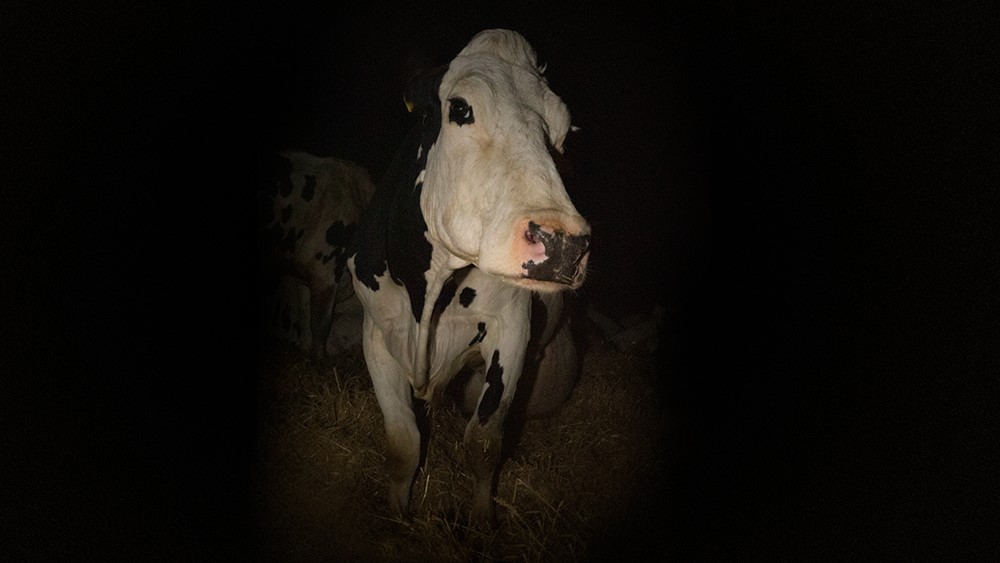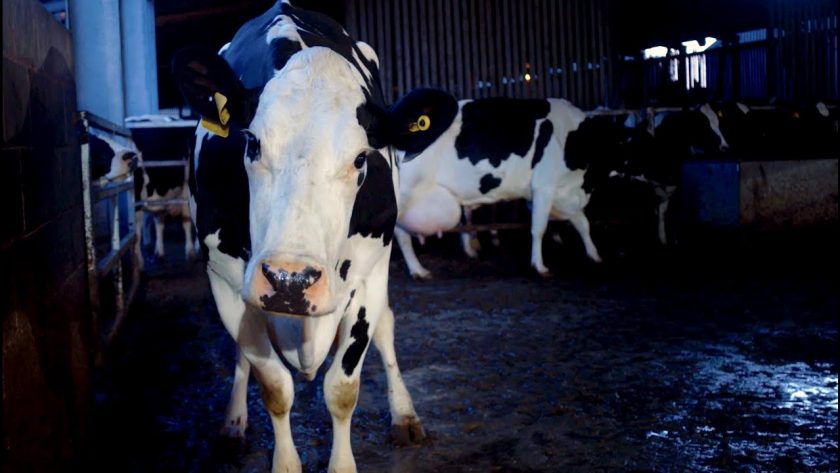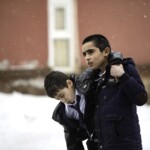BFI’s London Film Festival is in town! The FilmSoc Blog is back for the 65th edition of the city’s largest film festival, delivering a look at the hits and misses of the 2021-22 season.
Bryn Chiappe reviews Andrea Arnold’s raw and odd documentary about the everyday life of cows.
Andrea Arnold’s new documentary, Cow, is an odd film to explain to those who haven’t seen it. I’ve already experienced this several times when telling friends what I watched at London Film Festival this year and seeing faces that are bemused at best when I begin the description with: “so there’s just these two cows, and you follow them around for 90 minutes”. It’s a simple premise, albeit a somewhat unfamiliar one, and the film’s greatest strength is its willingness to see the concept through without being tempted to slip into a more conventional documentary format. Admittedly the highlights of a cow’s year are somewhat lacking in variation and there were several times that my mind began to wander during the film. However, the repetitive nature of the film’s content has the simultaneous effect of truly disarming the audience for moments of real drama. The contrast between time spent in the fields and being rigged up to machines for milking or undergoing medical examinations is a brutal one and one that invites the question of what is going on behind the cow’s huge, blank eyes as they observe these differing environments.
We see very few humans at all over the 94-minute runtime, and very little of those who do appear in the film. I was a big fan of this aspect of the piece. The cow’s world is Arnold’s foreground, and while the human world is always implicitly shaping it, it remains a backdrop for the animals’ lives. Pop music that’s being played on the farm is a regular soundtrack in a way that creates a Dogme 95-style unforced ambience, but is particularly interesting for its position as one of the most consistent times that language is present in the film. We hear the voice of Kali Uchis as much if not more than that of any of the farmers, and the music seems more of a point of investigation into human culture than the fleeting moments where people talk to the cows. It’s nice to see a documentary done in this way, one where the anchoring of the thesis is in visual language rather than speech. This gives a satisfying sense of pervading truth to everything that’s happening on screen. The film’s rhetoric is implicit (while undeniably present) in the sense that we simply watch non-verbal reality play out before us. It is a factual document about animals that resists the urge to have humans obscure the film’s potential findings by explain their own version of an animal’s reality.

With this being said, the film feels like an angry one a lot of the time. To watch it as a feminist piece would perhaps be missing the point and imposing inter-human versions of persecution onto human-animal relations, yet it’s difficult not to be led down this path on occasion. The female-centric content is inevitable – it’s a cow farm after all – but there’s a guidance to placement and editing of the scenes where cows are milked, or where farmers shove their entire arms into the cow’s vaginas, that is undoubtedly supposed to provoke the audience’s thoughts on the sexual violence of farming. They’re valid points to be making, and if implicit comparison to human behaviour is what it takes to get them across to an audience, then so be it, but I couldn’t help wondering whether the film is actually at its weakest and most reductive when it’s engaging in anthropomorphisation. It does this to great comedic effect at one point, when a bull appears for the first and only time in the film, as we watch the cow and bull seduce each other while fireworks go off the background and Kali Uchis’ Tyrant sets the steamy mood. However, when it comes to the more serious points of the film, its tendency to look for the human in the cows often leaves one feeling like the film is being disingenuous to its principles.
The most touching moments were those in which the cows were left untouched and seemed oblivious of the camera’s presence. When giving birth and looking after their calves, we get to see them in a state of being that is true. The same is true when they’re going to sleep or fighting each other. The thought that continually came back to me when the film really allowed the audience to observe, rather than directing their attention in any way, was a question of what the cows were thinking about. It seems impossible to answer most of the time, but I found it to be by far the most stimulating thing that the film gave me to mull over while I was in the darkness of the cinema. There’s one shot of a cow looking up at the sunset which I was particularly struck by. It followed on from a fairly long section of uneventful farmyard life, during which I’d grown slightly bored and had begun wondering how long this film would put me off eating beef for. I was jerked out of this musing by the image of the cow staring up at the orangey-pink sky for seemingly no reason other than to look. It appeared to be in the midst of an almost numinous experience, and I became surprisingly moved by it over the course of a couple of seconds. I noted all of this down and only afterwards came back to consider that perhaps this was a case of anthropomorphising on my part. But perhaps it wasn’t. I love the fact that I don’t know, and I think it’s the best feeling that a documentary of this nature could hope to impart.
Cow will be out on 14 January 2022:




